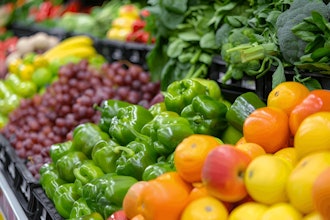MORGANTOWN, W.Va. (AP) — West Virginia's new agriculture commissioner has an ambitious plan to more than double the output of state farms within five years by growing the poultry and beef industries, and by encouraging school boards, correctional institutions and other government agencies to buy from local producers.
No single strategy can work, but a comprehensive approach can, Commissioner Walt Helmick said Friday. That includes trying to lure producers and processors to southern West Virginia — a virtually barren agricultural region — and persuading young people that they can make money farming.
Helmick told The Associated Press ahead of an evening address at the West Virginia Small Farm Conference that an entrepreneurial spirit will be critical to his plan for reversing a declining trend in production.
"We just want to help diversify the industry in West Virginia," he said. "We know that we have coal that's good to us, timber that's good to us. Chemicals and gas. Those have been solid industries. But we believe there's an opportunity to move agriculture to a level that is much more than it is today.
"We will employ people, we'll create quality jobs and we will grow a quality product for West Virginians," he said.
Helmick, a former state senator from Pocahontas County, was elected last fall to replace Gus Douglass, the nation's longest-serving agriculture chief. Douglass was elected to 11 terms since 1964 but decided not to seek re-election.
The conference in Morgantown was Helmick's first major speech to the state's farmers since his election.
At its peak in 1935, West Virginia had 135,000 farms but today has only 23,500. That's in line with national trends, but Helmick said West Virginia still has the nation's highest percentage of family-owned farms.
Though the economics of small farms are different, Helmick said there's tremendous opportunity for growth: West Virginians consume $7.1 billion worth of food every year, yet only $460 million of that is locally produced. And 53 percent that comes from the poultry industry.
Helmick wants to see West Virginia lure a poultry operation, which would also bring much-needed jobs, to the southern part of the state, and expand the beef industry beyond Greenbrier County, where it's now centered.
The state once produced 677,000 beef cattle a year, he said, but now produces just 365,000. Rebuilding that industry will require land and more processing centers, but it can be done, Helmick said.
Preston County High School, for example, now has the only school-based processing facility, he said. West Virginia could create more, involving young people earlier on and showing them sound business plans that might encourage them to continue family traditions.
"It's hard work," he said, "so there's got to be a monetary reward. That must be part of it."
Farm-to-table initiatives that connect growers directly with consumers are also vital parts of the formula for success, Helmick said.
Connecting growers with 55 county school districts, regional jails and state prisons, and colleges and universities could benefit both the farmer and the consumers, who will be eating fresh, healthy food from sources they can trust.
Regional supply systems, with cooling and storage facilities that serve several counties, would help build such relationships, Helmick said.
Like all state agencies, the Department of Agriculture faces a 7.5 percent budget cut in July, but Helmick said he won't be following through on an earlier proposal to eliminate pest-control programs for black flies and gypsy moths.
"That will not happen," he said. "We can't sacrifice our timber and tourism industries."
Rather, he said, there will be smaller, across-the-board cuts and the elimination or consolidation of positions through attrition.
Though he didn't offer details, Helmick also said budget cuts won't derail his plans for a bond issue that would fund construction of a new agricultural headquarters "in Kanawha County somewhere," closer to the seat of government in Charleston.
The department is now housed at a 1950s-era, former Air Force radar station in Guthrie, about 5 miles outside the capital.
"It gives the impression, which has really become a reality now, that farming is secondary to anybody's thoughts," Helmick said.
"It's a pretty good way of life. And it's great for our state," he added. "West Virginia will be improved ... if we indeed improve agriculture."





















